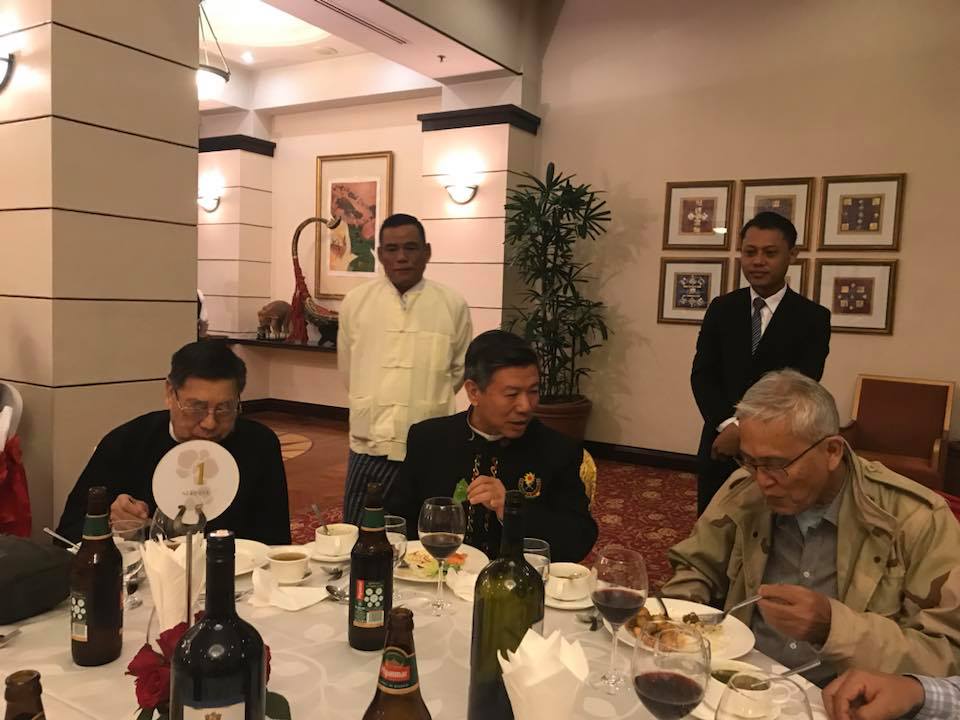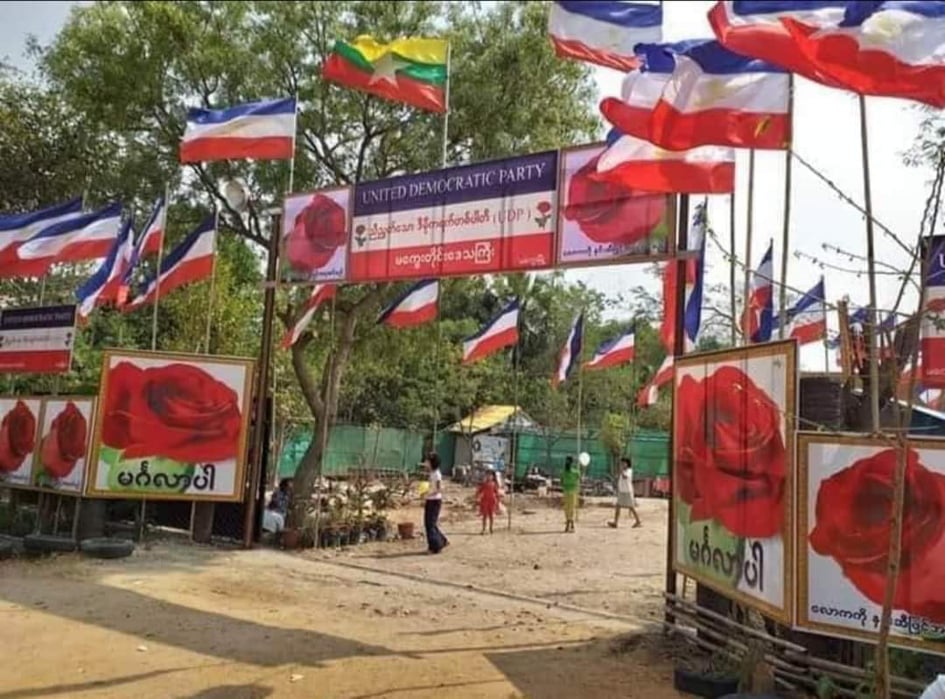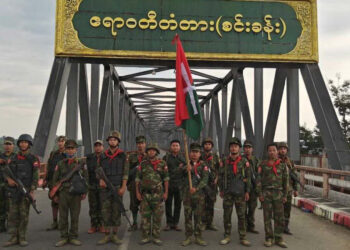When people talk about political parties in Myanmar ahead of the November general election, what normally pop-ups in their mind is the National League for Democracy (NLD) and the main opposition and military proxy, the Union Solidarity and Development Party (USDP).
In terms of the number of candidates filed for the election, the NLD is largest with 1,143 while the USDP has 1,129 candidates. But there is also a less well-known party with more than 1,130 candidates.
Enter the United Democratic Party (UDP).
The party chairman is U Kyaw Myint, also known as Michael Kyaw Myint or Michael Hua Hu, but few people know him in Myanmar.
But the party claims he is ethnic Kachin and the adopted son of Zahkung Ting Ying, the leader of the New Democratic Army-Kachin (NDAK) militia group in northern Kachin State. According to a party leaflet, he has been involved in politics since he was 16 and a follower of the legendary Thirty Comrades and late Brigadier General Kyaw Zaw.
It said he was also a “peace builder” in 1989 when the powerful Communist Party of Burma (CPB)faced mutiny and collapsed, according to the party statement. U Kyaw Myint claimed he once served in the United Wa State Party (UWSP). But many senior officers in the UWSP deny any knowledge of him.
U Kyaw Myint claimed he was a commander in the CPB in the late 1980s, rising to second-in-command in the northern division of the CPB’s army under Zahkung Ting Ying. But former CPB members said they did not remember him.
In addition, he also received several degrees from Harvard University and universities in Canada. He is a successful businessman but few in Myanmar are familiar with him and his background. None of his claims can be independently confirmed.
But some political exiles have known him. So who is U Kyaw Myint?
According to Burmese opposition sources in Canada, the UDP had no chairman when it was founded in around 2010 but it was led by well-known Burmese businessman U Kyaw Myint, also known as Michael Hua Hu.
When he was in Myanmar, U Kyaw Myint ran a company, Myanmar Kyone Yeom, which was involved in money laundering in the 1990s.
The now-defunct Hong Kong-based magazine Asiaweek reported that a company run by U Kyaw Myint was laundering money for the United Wa State Army (UWSA), which was then heavily involved in the drug trade.
Asiaweek reported in January 1998 that Myanmar Kyone Yeom was accused of acting as a “money-washing machine” for the UWSA.

In November 1998, Jane’s Intelligence Review reported that U Kyaw Myint, who claimed to be a deputy minister of finance for the UWSA, flouted Myanmar’s business laws. The company was outlawed by the Myanmar Investment Commission and U Kyaw Myint was given a 10-year prison sentence.
A US State Department’s“International Narcotics Control Strategy Report, 1998” said in February 1998 that the Burmese regime effectively suspended Kyone Yeom for violating the Myanmar Company Act, although the government did not indicate that this was a counter-narcotics action.
He did not serve his full jail term and escaped. Several former intelligence officers who served in the previous regime said they had no idea how he had escaped from prison. It was suspected that he bribed prison officers to send him to a labor camp from where he escaped to Thailand.
He then went to Canada where he took asylum. However, U Kyaw Myint once told the Burmese service of the Voice of America that he was arrested for political reasons and charged under the State Emergency Act. He later escaped from prison and traveled first to the US and then Canada, reportedly with the help of the US Drug Enforcement Administration (DEA). In Thailand, he reportedly met US diplomats in Bangkok and provided information about illicit drug activities in Myanmar. He then went to the US.
In April 2009, according to the Vancouver Sun, U Kyaw Myint said the DEA helped him to obtain political asylum in the US and he moved to New Jersey. He later moved to Canada in 2002, seeking political asylum and lived in Vancouver.
News then surfaced that U Kyaw Myint was involved in NAH Development Group Inc., a company based in Canada.
In 2009, news of U Kyaw Myint came into the spotlight in Canada when trading in the Future Canada China Environment Inc. was halted by the US Securities and Exchange Commission, when the value of the company’s stock rose rapidly to more than US$1 billion.
The price jumped on the strength of a proposed merger with a company that appears to be connected to Michael Hua Hu [U Kyaw Myint], according to a report in the Vancouver Sun.
“The commission temporarily suspended trading in the securities of Future Canada China Environment Inc. because questions have arisen concerning recent trading activities in the company’s stock during which its share price increased from US$ 0.92 to US$28.50,” the US Securities and Exchange Commission announced in January, 2009.
The commission cautioned brokers, dealers, shareholders and prospective purchasers that they should carefully consider the details along with any information subsequently issued by the company.
“The company has negligible assets and no operating business. Its stock price ostensibly jumped on the strength of a proposed merger with a company that appears to be connected to Michael Hua Hu, a former Burmese businessman now living in Vancouver,” the Sun reported in February. After reporting on these issues, U Kyaw Myint then threatened to sue The Irrawaddy.

In 2011, the British Columbia Securities Commission panel added him to a “disciplined list”, which means it permanently banned U Kyaw Myint from the province’s securities markets, and fined him US$1.5 million for engaging in illegal insider trading and making false and misleading statements to investigators.
The BCSC panel found that U Kyaw Myint, while a director and chairman of Maple Leaf Reforestation Inc., bought shares in the company while knowing undisclosed material information about a biodiesel project (known as the Xinjiang project) that Maple Leaf was negotiating in China. The panel also found that Hu made false and misleading statements to commission staff when he denied knowing the individual who held the online brokerage account that Hu used to make the purchases.
He denied allegations of drug dealing and money laundering in a statement.
“I, U Kyaw Myint, have never conducted or been involved in the illegal drug business or money laundering business in my life,” said the statement on his website.
U Kyaw Myint stated: “All my businesses in North America and Asia are legal.”
Ahead of Myanmar’s general election in 2010, U Kyaw Myint recruited some politicians in Myanmar and established the UDP inside the country. U Thu Wai, a veteran politician, and U Ye Tun, a well-known businessman, in Yangon, were named chairman and vice chairman of the party. But they were no longer with him. In his interview with The Irrawaddy in 2015, U Thu Wai said U Kyaw Myint was close to some of Myanmar’s diplomats, including an ambassador and a military attaché in the US and they issued the papers enabling him to go back to Myanmar. The party also contested the 2015 election but it failed, as it did in 2010.
It is still a mystery how someone with a shady background like U Kyaw Myint established the UDP and registered the party in Myanmar. Now he lives in Yangon and travels with several bodyguards. He also had closed meetings with several business tycoons in Myanmar. It is believed that he has solid financial backing and support from some ethnic armed groups.
In December 2013, his meeting with the then Chinese ambassador to Myanmar, Yang Houlan, was posted on the Chinese embassy website. It said: “They had a extensive discussions on the recent development in Myanmar’s political, economic and social life as well as the proposed exchanges between two countries and parties. Both sides agreed to promote people-to-people communications and mutually beneficial cooperation in the future.”
Meanwhile, the party seems to be in top gear as the election approaches. In some areas, it was known as the “Red Rose Party” after the party’s logo.
In its electoral pledge, the UDP said: “If you don’t see any development in the country in five years, send the chairman to jail and set the UDP posters on fire.”
You may also like these stories:
Election 2020
Candidates From Four Parties in Myanmar’s Kachin State Face Off in Debate
Political Party Withdraws Election Broadcast After Censorship by Myanmar Authorities
Myanmar’s Election Commission Rules Out Postponing Election Due to COVID-19

















